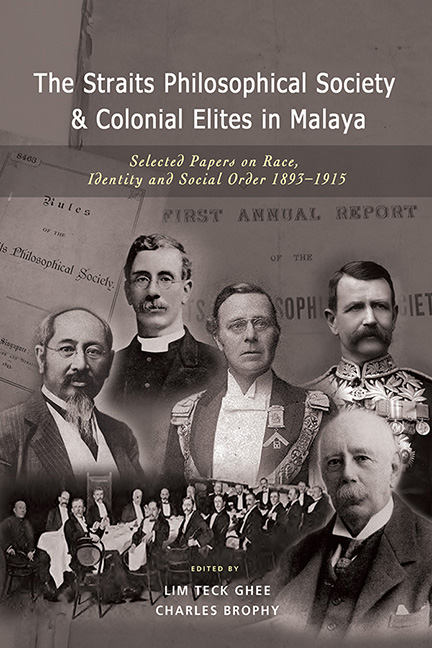 The Straits Philosophical Society and Colonial Elites in Malaya
The Straits Philosophical Society and Colonial Elites in Malaya 20 - The Chinese Revolutionary Movement in Malaya
Published online by Cambridge University Press: 09 January 2024
Summary
Editors’ Note
Although a strong supporter of the British colonial administration (he was appointed a member of the Straits Settlements Legislative Council in 1895 at the early age of twenty-six), Lim Boon Keng played a prominent role in the Chinese nationalist movement in Malaya. He had close ties with Sun Yat-sen and Kang You-wei, hosting the latter in Singapore in 1898. In 1901 he authored The Chinese Crisis from Within (edited by Society member Rev. G.M. Reith), chronicling the reform movement in China. In 1906 Lim became a founding member of the Tongmenghui, an anti-Qing dynasty movement, established by Sun Yat-sen, and served as president after it became the Singapore branch of the Kuomintang in 1912. After the Qing dynasty was overthrown in 1911 he was appointed to various medical positions in China and became the personal physician of Sun Yat-sen. Significant to Lim’s thought in this period was his belief that the Babas of Singapore, with their mixed culture, could play an important role in the reform of Chinese society.
Lim’s 1913 essay to the Society highlighted the importance of the Chinese of Malaya to the nationalist movement in China and also took stock of the nationalist movement itself. Listing down the effects of the movement including the removal of the queue, the adoption of European dress, the introduction of representative government and the emancipation and education of women, he also noted its tendency towards extremes. “Fanatics”, he argued, influenced by the “crude socialism of the workmen of Australia” sought for “equality in all things, abolition of social, legal, and family distinctions and suppression of religion”, believing that the “masses only require work”. This materialist and radically egalitarian philosophy was antithetical to the Confucianism to which Lim had long subscribed.
In his view these questions had largely been resolved in favour of Confucianism, with popular opinion in Malaya and China defending Confucian values against attempts to abolish such teachings. Echoing his belief in the progressive role that the Baba Chinese could play in China’s development, Lim perceived the support for Confucianism amongst the Straits Chinese as an expression of their openness to what was best in Western culture “while intending to maintain their old institutions that do not conflict with republican principles”.
- Type
- Chapter
- Information
- The Straits Philosophical Society and Colonial Elites in MalayaSelected Papers on Race, Identity and Social Order 1893-1915, pp. 292 - 304Publisher: ISEAS–Yusof Ishak InstitutePrint publication year: 2023
